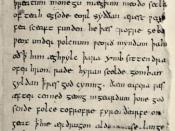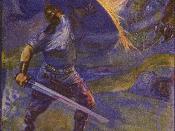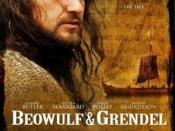Anglo-Saxon Ideal Code of Conduct
he epic poem of "Beowulf" presents the characteristics of two heroes, Beowulf
and Hrothgar. During this Anglo-Saxon time period, Hrothgar rules as the king of his
Danish lands. However, this king faces many problems due to the disturbances of a
monster known as Grendel. As an Anglo-Saxon warrior of the time, Beowulf hears of
this creature and journeys through the hero's path to kill Grendel. Through this journey,
Hrothgar and Beowulf reconstruct the code of conduct of an ideal Anglo-Saxon king and
warrior.
The Danish lands of the time are ruled by Hrothgar, a respected and generous
king. These qualities of character were admired by the people of his time and place. All
people of Hrothgar's kingdom respected this king, and they all accepted his "very word
far and wide as a command." The people also give him great titles such as the "Lord of
the Mighty Danes," "guardian of the Scyldings," and "protector of warriors."
Much of
these people's respect come in response to Hrothgar's generosity to everyone. This
generosity can be seen towards Beowulf, when the king gives his thanks for the heroic
deeds of the warrior. Hrothgar rewards Beowulf with priceless material as he says to the
warrior, "You shall lack no earthly riches I can offer you." The people of the land also
trust their king, who holds a strong belief in God. In the scene where Hrothgar celebrates
Grendel's death, he holds the monsters hand as he says, "Let us give thanks at once to
God Almighty for this sight." The followers of the king both respect and trust their ruler,
and through his generosity and strong trust in good, Hrothgar displays the ideal code of
conduct for an Anglo-Saxon king.
Mano 2...


